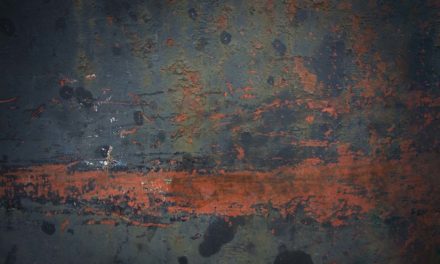Ramona
by M.A. Bailey
Issue 1: Grotesque | 3300 words

Excerpt from the zine The Story of What Has Happened by Allie Cheroutes
It was so strange to smell the acrid odor of gasoline these days. Fossil fuels had been reduced to recycled dung, and the odor was much earthier than gasoline. The caustic stench wafted over me as if directing me, pulling me to my destination, guiding me to the one who would set my body right.
The balanced gait of my walk felt all sorts of wrong. My steady footsteps echoed on corrugated metal roofing, which had been laid over a narrow sinkhole to function as an impromptu repair to the road. Proper repairs didn’t happen in places like this—places where the smell of gasoline could lead you down alleys to a destiny that the top brass could never be bothered to understand.
••••
She was in her own way beautiful. The seemingly wild mess of wires that ran out of her metal frame at the joints and the neck were all laid in such a subtle pattern of red, white, and green; the layman’s eye could never appreciate the artistry. A steady flow of smog escaped at the nape of her neck—her body burned increasingly expensive gasoline. She called herself Ramona.
She had modded her face to be more humanlike. Her face was a custom job crafted from dozens of metal scraps that lay over one another like shingles, but they moved in an expressive way that the typical machine wouldn’t be able to do. They had long ago outlawed machines crafted to look like us, like humans, four limbs and all. So her augmented face was really a clever design. She was just machine enough to skirt past the expectations that people and law have of their machines, but expressive and human enough to fool the confidences of an organic person. Her smile calmed me as I approached.
The whining of her motors pulsed as she paced back and forth at the end of the alley buried in the center of the city, coffined in by the rusting metal walls of tenements. Rainwater tapped hollowly in the distance. Ramona smiled at me with a surprisingly nuanced expression of relief. If she had thought I wouldn’t come, she didn’t understand. I was walking alone down dangerous alleys, walking toward illegal machines that deemed themselves a Person so much so that they were committing criminal acts. Her end goal: to reach a plausibly Person enough state to pass in the mainstream world.
Ramona was tired of being machine. She was more than machine just as I was less than four limbs.
She held my hand warmly as she introduced herself, but she was cold to the touch. I sensed an anxiety or insecurity in her when I reflexively jumped from the iciness of her metal hands.
“This is the point where I am sincerely afraid you will run away,” a modulated voice sounded from a small speaker tucked behind her dexterous mouth. “If I bring you into my clinic, then we must have one another’s complete trust.” She reluctantly touched my hand again, but this time I did not flinch. “We must be prepared to never look back. Your body can not be repaired as my metal body can.”
I nodded. An undulated digital bark quietly emanated from her mouth. I assumed it was meant to be a laugh.
“After today, my laugh will be much less distinct,” she said, sensing my thoughts. Had she been made of flesh, I might have feared that she was a witch, the kind my grandmother had warned me of, one able to read minds and lure good souls into their dens to work their dark arts. But Ramona wasn’t a witch. She was concerned only about her own soul and the existential crisis of whether she had one. After today, after my contribution, she would have her answer.
••••
Her clinic, as she referred to it, was cleaner than I expected. Peripheral worries of blood infections and rusty blades were cut away by the sight of her neat, sterile workspace. Ramona led me to a sloped metal slab with a drain at the foot. She looked very nervous, a testament to the clever design of her shingled face. The truth was, I was nervous too. The sheen of the metal and the sight of the drain and troughs evidently there to catch the blood, my blood, made the elated butterflies inside my stomach twist into anxiety. This was it.
“I must tell you how grateful I am that we benefit one another in this way. You will complete her,” Ramona said. She gestured for me to lie down on the metal slab. I hesitated. Ramona sensed my fear. “Would you like to see her? You’ll be the first.”
I swallowed. Gasoline wafted over me as she wheeled away from the surgical station. Hesitantly, I followed her.
“Your legs may be a bit older than most of her parts, but they will be a beautiful match, none the less.” Ramona turned back to look at me. Easily, she read the discomforted look on my face. She turned and approached me thoughtfully. “I apologize, Greta. There are still some things I have to learn about being a person, and I hope that I did not hurt your feelings when I remarked on your legs.”
She wasn’t wrong. My legs reflected all of my 52 years with their varicose veins and childhood scars. They were certainly beautiful, my legs—taut and toned. But they were no longer the object of desire so luridly pursued in my rebellious youth, as my unremarkable, perhaps ugly, face never attracted prospective lovers. I wished I could appreciate my legs in the way strangers did, so I allowed them to indulge in their desires just to feel a vicarious understanding of loving what has plagued me—my legs.
I wish Ramona had found me 30 years ago; then we would both be happier. My legs would better suit her new body, and I would not have spent decades trying to reconcile with my own limbs.
Ramona’s metallic claw graced my chin tenderly and withdrew me from my reverie. “No.” I smiled like a mother nervous for her ailing child, just doing her best to resemble strength. “I’m not troubled.” Tears broke from my eyes. “I’m just overwhelmed. I’ve waited all my life for this.” It wasn’t a lie, but she needn’t know precisely why my anxiety was welling up. I was afraid of the pain. I was afraid of the Frankenstein’s monster she was premiering to me. I was afraid that the inability to identify with my lower extensions would spread to other limbs once my legs were finally severed. But I wasn’t only doing this for me; I was doing this for Ramona.
I smiled and indicated that we should continue. The slot that functioned as Ramona’s mouth turned upward, and she led on. We passed through a hallway peppered with doors and down a flight of metal stairs that Ramona descended in an ungainly fashion, and soon we were standing in another surgical station. This one was much like the one upstairs, but there were no windows to paper over, and much of the furniture and equipment was altered to better suit Ramona’s mechanical limitations.
On the far side of the room, there was a circular curtain. I knew immediately what it hid. “Yes, that is where I keep me.” Ramona puttered toward the curtain. “I find my body hard to look at when I am not laboring over it; the longing that the beautiful creature provokes is too much. At least when I am building me, my body, I know I am getting closer to my true self, imbuing the fleshy shell with soul, my soul.” If Ramona could have cried, she would have, so I did it for her. Even the unnatural modulation of her voice couldn’t obscure the deep longing that had driven Ramona to the secret and grotesque taboo of building herself a body, a human body.
Ramona’s flesh was not the horror I had anticipated. The curtain’s hooks jingled across the rod like a fanfare as Ramona yanked it open to reveal a young, beautiful woman embroidered with needles and plastic tubes and colored wires. Scars, half healed, and stitches, freshly sewn, ringed the limbs and neck of the body, revealing its patchwork. This was the correct Ramona. She would have raven black hair and varying shades of olive skin, aside from her pale right hand and my dark legs. An elegant tattoo of a crane decorated her right arm. The only thing that blocked Ramona’s flesh from being a complete woman were the two gallingly absent limbs—legs, my legs.
“You can touch her,” she said. The flesh was warm. Studying more closely, I realized that her chest rose and fell ever so slightly. Her exposed breasts were small and her areolas were dark. There was a pulse, I checked. “Yes, my flesh is ready to be completed and for me to take up residence.” Something felt strange knowing that this body was a working, pumping machine. I had preferred her when I thought she would be something more of a corpse.
“Where did you—“ I was ashamed to finish my question. Here she was allowing me to see her greatest desire, work, and crimes, and I could only remark on the macabre.
“Get my head?” Ramona finished the question for me. “The flesh for my head was sourced from my old friend, my oldest friend. She gifted the flesh to me when she died. She was my first body part.” Ramona pinched the head’s dark black hair in her claw.
Distantly, a dog barked, hardly heard over the wheezes and beeps of the machines that kept the flesh of Ramona’s body, waiting for completion, in stasis.
Contagiously, I felt myself becoming endeared to the flesh on the metal table. She was beautiful. Her looks married with Ramona’s motherly persona would create what could only be considered the ideal woman. I wanted to help her, and she wanted to help me. I scolded myself for my anxieties and, in a practiced fashion, bottled down the feelings I didn’t want or like.
“You are ready,” Ramona touched my arm. It wasn’t a question, she had seen the resolve settle over my face, the confidence that came with believing that I was doing more than reconciling my relationship with my own body—I was also allowing someone else, in far direr straits than I, to do the same.
••••
The metal beneath me was cold, and the paper gown that Ramona had given me was split down the back, causing me to jump from the icy impact of the surgical slab. Ramona voiced her envy, eager to also feel the sensations afforded only to flesh. I thought how disappointed she was likely to be, but I kept this dark thought to myself. Today was a celebration.
The cry of the saw tried my resolve, but the absence of pain, as Ramona kissed the spinning blade to my flesh, absolved my fear. No pain, just pressure and then release. The sudden sensation of my brain remapping its understanding of its shell, feeling confident for once in its perception, was paired with the sudden lack of weight tethered to me.
I watched her with reverence as she laid first my left leg and then my right on a wheel borough filled with ice. Ramona hummed softly, sounding like a musically gifted fan.
I couldn’t feel the blood rushing down the metal slab, but I could hear the sucking sound of it gathering at the drain, straining to fill the plumbing pipes faster than the screen would allow. It was cold in here. The air was comfortably compressive, like a thick blanket swaddling me to sleep. The lack of beeps and gasps let out by medical equipment was suddenly accentuated by the sound of Ramona’s retreat.
“Ramona,” I said as best as I could, but probably too quietly to be heard. My tongue was heavy, and though I wasn’t tethered to the slab, it felt as if I were bound in place. Either she didn’t hear the wet plop of my body rolling off the slab, or she was too preoccupied with the thrill of completing her flesh to be bothered. She was leaving, and I was gushing blood, quickly descending to my death. This wasn’t the deal. “Ramona!” I managed to cry out this time.
The smell of gasoline faded. Ramona was gone. I heard her wheels clanking down the metal stairs and the crashing impact of the wheelbarrow carrying my legs on each step. Bits of ice audibly fell to the concrete ground below. My arms felt leaden, but still, I dragged myself after her, leaving a thick trail of red-brown blood behind me. The coppery smell of blood overtook the room as the cloud of gasoline that surrounded Ramona dissipated. Still, my stumps felt nothing of the violence that had befallen them—just a dull pressure and the sprinkling touch of dirt stirred in my wake, settling in my open wounds. I hoped the flow of blood would be enough to eject any foreign substances that could cause an infection. Because, in my bloodless brain, I still hoped to remind Ramona that she hadn’t closed me up.
My lumbering and clumsy descent down the metal stairs was noisier and more graceless than Ramona’s machine tumble. I had been designed to take stairs in a way that she hadn’t, and now I had relinquished the privilege and perhaps my life. My blood pooled on every fourth step as I rested to catch my breath and concentrated on not closing my eyes. The surplus of blood spilled over and dripped rhythmically on the concrete floor ten feet below, mingling with melting ice. Somewhere a dog barked.
It took me longer than it seemed to make it to the basement. I had dozed off a number of times on the stairs. At the bottom, I could hear Ramona singing. Her voice was quavering and kind, a Mary Poppins of the new age. This was her victory song. Long from her mind were the thoughts of me and the price of completing her body. Ramona was a machine, heart and soul, and the potential of her escaping that inhuman confine by retreating to a new flesh body seemed impossible to me now. I was teetering on the brink of life as I dragged myself into Ramona’s private lab. Her song echoed around the lofty room.
“Ramona,” my voice was nothing more than dry gears rubbing against each other in vain.
Three distinct wires ran out of the head of Ramona’s flesh: red, white, and green. Collapsed in the entryway, I watched Ramona tether herself to the red and white wires. The shingles of her face were contorted in an immeasurable fit of joy. She was a child waking on Christmas morning; a mother relieved to hear her newborn is healthy. My legs had been sewn onto the body hastily but firmly. Runnels of blood, my blood, blood that had been trailed all over Ramona’s hideaway by now, ran down her new body’s legs.
The lights flashed wildly, or else I was blinking; my eyes steadily faded in and out of focus. A burning sensation in my new stumps brought me back. The anesthesia was wearing off, and the unclosed stumps were beginning to break through the medicine’s grace with their emergency call. Something had been severed, my body wanted to say, but by now the loss of blood limited my body’s alert system to only the most vital information. I was dying.
Ramona stopped singing. Her focus was shifted to a desktop computer on a swiveling table hovering next to the flesh body that she had wired her mechanical self to. In the hallway, the dripping of my blood tapped irregularly from the flight of stairs. In contrast, Ramona’s claws clicked rhythmically over the keys.
Again the lights flickered. The building’s power was being taxed and refocused to the basement. Frankenstein required more electricity than the building readily supplied to achieve birth. Or I was dropping in and out of consciousness. A loud crack and a visible two-way stream of electricity jerked both of Ramona’s bodies, her mechanical and flesh selves. The power finally gave in to Ramona’s demands and blew out just after mustering enough electricity to satisfy her. Then a flicker, and backup generators kicked in.
My eyes closed. I woke shortly after to the strange barking sounds Ramona’s flesh body was making. Was it laughter or had her human self gone haywire after the electrical surge? From my vantage point on the floor, I was unable to see her flesh’s face, but Ramona’s mechanical body had fallen listless to the ground, detached from the wire connection at the back of her human body’s skull. She lay there almost as if she were mimicking me, or mocking me perhaps. Occasionally, she jerked slightly, expelling a waft of gasoline out of her neck.
I gazed at Ramona’s shell, hoping she hadn’t failed; hoping still that she would close me up once she took notice of my plight. Whether man or machine, I needed Ramona.
Two brown feet, my feet, touched the ground softly, experimentally. They recoiled from the cold concrete before settling back down slowly. She was alive. She had won, against all the odds, and was able to transcend into the body she needed. And I had fallen at the finish line.
“Ramona,” I whined. Her new ears were too human to hear such a weak cry for help, and I knew that. “Ramona,” I tried again.
She saw me. We made eye contact, only my right eye managed to remain open at this point. She was wide eyed and wild looking. She struggled with her face, moving it inquisitively like a child, and took a few shambling steps. The corners of her mouth upturned and split her face to expose perfect white teeth. I smiled in return. She was gorgeous. My legs were gorgeous. Veins and scars. She was constrained by learning the means of controlling her rightful body, so she ambled towards me clumsily. She was going to help me.
“Ramona.”
She stepped over me. Her hands were held out to each side, balancing, like a child playfully walking on a low ledge.
“Ra…”
I flopped fish-like with my final shred of life. Ramona jumped and slipped in the pool of blood that surrounded me, thick like hot wax. I was guttering out, and she was the only one who could help me. If I died here, I wouldn’t be found for months. By then my body would have to be identified by dental records, and my hidden truth may come to light. My family would be aghast, branding me a fetishist for mutilation. I knew that. I knew the risk in coming here, but how could I, on two legs that shouldn’t have ever been mine, have turned away from this opportunity.
“… mona.”
Ramona stumbled and fell forward, knocking her head on the metal railing of the stairs. A hollow thump rang up the stairwell. I couldn’t see her now. I couldn’t move to find sight of her, and that was all right, darkness was settling over my vision anyway. But I could hear her, unmoving she cried in pain on the floor of the stairwell until her sobs mutated into a braying laugh. I heard her stand and begin experimenting with how to ascend the stairs, by sound alone I knew that her bearing was no more graceful than when her mechanical self took the steps. Softly, echoes of her work song bounced down the stairwell and lullabied me.
I lay there, silent and still, watching Ramona’s old body reflect mine, listening to the tapping of the rain make an off-kilter rhythm to accompany Ramona’s distant song, inhaling the stinging aroma of gasoline. Finally, I was not whole, but complete.
The character Greta in “Ramona” suffers from body integrity identity disorder (BIID). BIID is a rare psychological disorder in which the sufferer perceives that one or more of their healthy limbs or organs does not belong to the rest of their body. The physical body of one with BIID does not match the body the individual identifies with. Currently, there is no official treatment for BIID and the disorder is not listed in the DSM-V. To read more, please see the following link.

M.A. Bailey
M. A. Bailey is a fledgling speculative fiction author who fears most social interactions, digital and physical. Instead, Bailey keeps close company with the inhabitants of their imagined worlds and eats a lot of cheeseburgers. Oh, and beer, there’s always beer.




